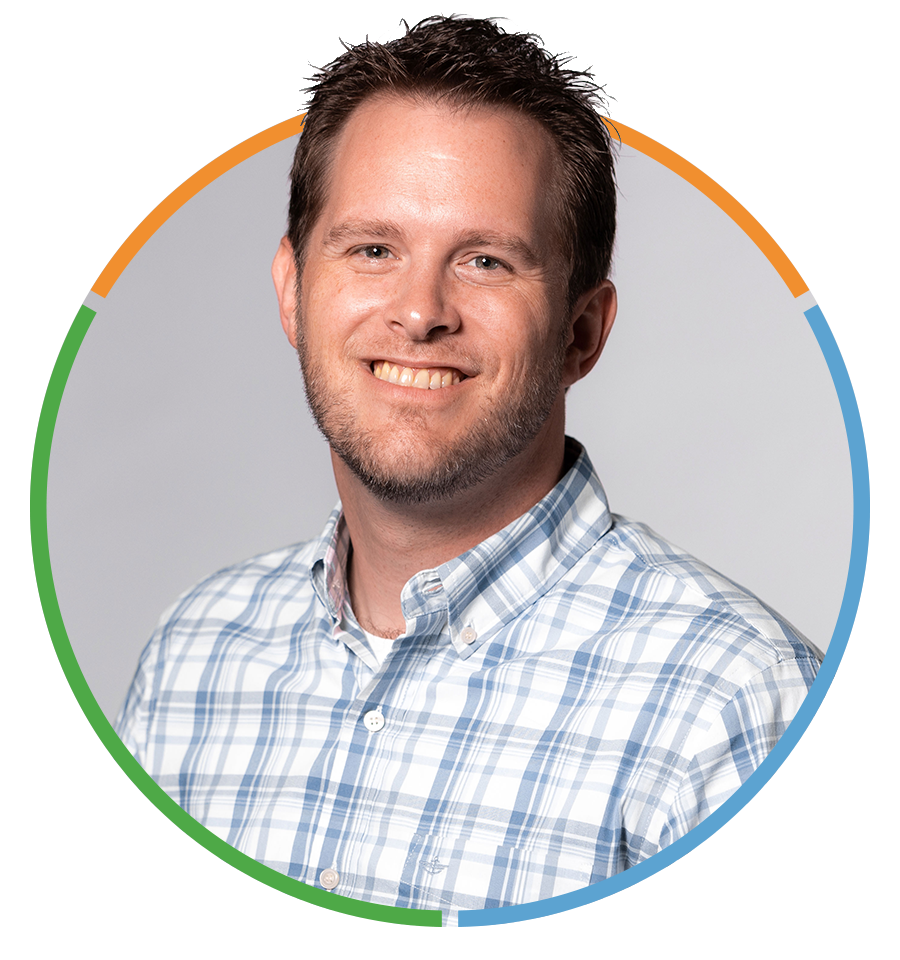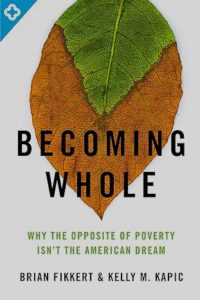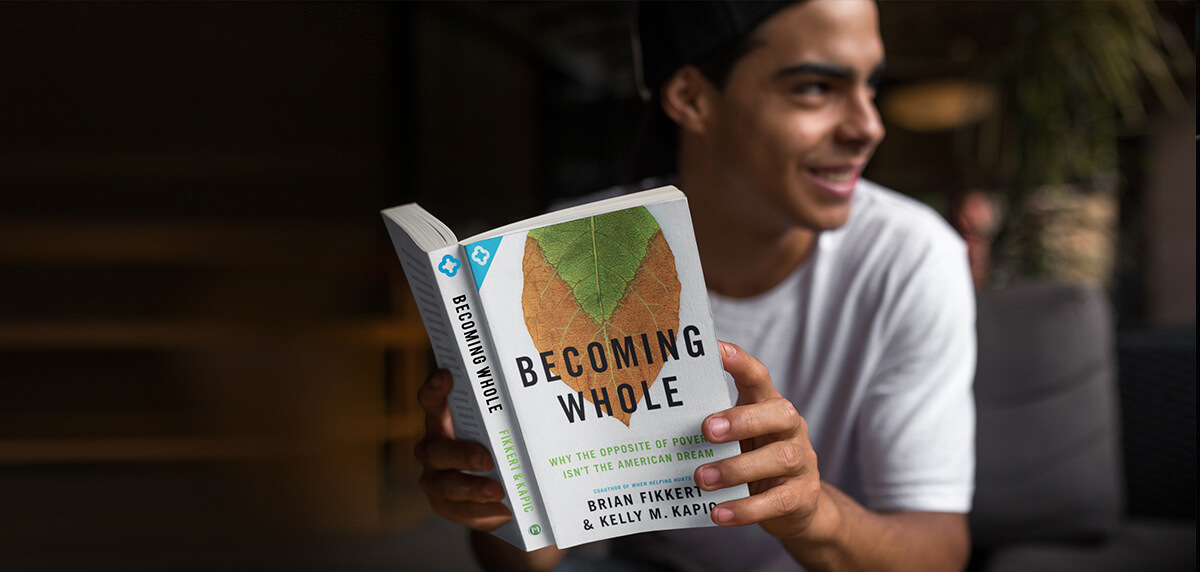Salvation, the American Dream, and Becoming Whole: A Sequel to When Helping Hurts

Jeff Lofting
Director of Education
Read more from Jeff
Jump to:
The Purpose of the Book | The Perspective | The Key Points | Details We Love | Considerations | Who Should Read This?
The Purpose of the Book
Becoming Whole, written by Brian Fikkert and Kelly Kapic, is a sequel to When Helping Hurts. It targets the poverty-fighter who has already been introduced to the concepts in When Helping Hurts and who has implemented or plans to implement changes in their practices to help individuals conquer perpetual poverty. It zooms into the underpinnings of those practices, further examining what the actual goal is. Is it to help individuals attain the American dream? Is it simply to lead others to spiritual salvation? Fikkert and Kapic contend that our true aim should be to help individuals become whole, as God intended them, and they provide a full exploration of why this should be our end goal in poverty alleviation efforts, including many practical examples and stories.
The Perspective
Whereas When Helping Hurts touches a bit on the scriptural basis for re-examining our efforts to “help” the poor, this follow-up focuses on deep theological and philosophical foundations, ultimately pointing to the necessity of emphasizing individuals’ relationship with God as the primary step toward escaping poverty. But, Fikkert and Kapic make clear that one’s reconciled relationship with God and the healing and recalibration that occurs in one’s mind, will, affections, and body should lead to the reconciliation of the other three foundational relationships. One might say that they are promoting a holistic approach to poverty alleviation and development.
The Key Points
Individual and Cultural Formation:
In Part I of the book, Fikkert and Kapic explain that individuals and cultures are shaped by metanarratives, “overarching account[s] of the nature of God, of human beings, and the world.” These metanarratives shape individuals and communities through three channels.
- The story of change represents the community’s conception of the goal of life and how to achieve that goal.
- Formative practices are the behaviors that the community believes will help achieve the community’s goals.
- Environmental and social systems are the institutions that are formed to encourage the formative practices, such as schools, churches, laws, or social activities.
The individual influences these three channels, but the community, or the whole collective of individuals, also influences the individual in these areas through what Fikkert and Kapic call a “formative feedback loop.” This process ultimately makes the community what it is. They posit that, of the three, the story of change is the vital element that must be examined in order to alleviate poverty, as the formative practices and environmental and social systems are based on it. The story of change, though, is based on metanarratives.
The Three Foundational Metanarratives:
Throughout the book, Fikkert and Kapic explain how three foundational metanarratives interact to influence individuals’ and communities’ stories of change. In part two of the book, they introduce these metanarratives:
- Historic Christianity holds that the individual is created by God in His image with a body, mind, affections, and will that are used to interact in healthy relationships with God, self, others, and the rest of creation.
- Western Naturalism denies a divine being and elevates man as the “master of the universe” whose intention is to serve their own self-interest.
- Traditional Religion acknowledges a divine being or beings but who cannot be personally known and are arbitrary and capricious in their interactions with man.
One story of change that has emerged from an interaction between Historic Christianity and Western Naturalism is “Evangelical Gnosticism,” and it has greatly influenced the Western church’s approach to charitable practices. Western Naturalism’s emphasis on the physical and meeting its material needs in the here-and-now has displaced Historic Christianity’s theme of Christ “reconciling all things.” In exchange, Evangelical Gnosticism promotes solving an individual’s “legal problems” with God, reducing it down to obtaining eternal pardon through accepting Christ but then pursuing the dead-end materialism of the “American Dream” that will always fail to bring wholeness that comes from reconciliation with our Creator.
According to Fikkert and Kapic, Evangelical Gnosticism’s story of change can be summed up this way: “The primary goal of life is to get the soul to heaven for all eternity” with a secondary goal of “making the body happy in this life through self-centered, material consumption.” If the Western church is guided by this fallacious story of change, we will never find full satisfaction. Furthermore, if Evangelical Gnosticism guides our poverty alleviation, neither we nor those we try to help will experience full restoration. So, what should the story of change be for us and for those we’re attempting to help?
God’s Story of Change:
According to Fikkert and Kapic, everything we do to help individuals in poverty flows from the story of change we embrace. What is the goal of life? How can this goal be achieved? In summary, Historic Christianity focuses on the individual as being created in His image for relationship and to experience shalom in all its meaning, including safety, tranquility, wholeness, friendship, and contentment. After the Fall in Genesis, this shalom was broken, including the four foundational relationships.
The goal of God’s story of change is human flourishing, which is experienced when individuals use “their mind, will, affections, and body to enjoy loving relationships with God, self, others, and the rest of creation.” This must be our goal in poverty alleviation.
Fikkert and Kapic spend the remainder of part three discussing how to achieve the goal of God’s story of change: “Through the gift of the Son and Spirit, the triune God accomplishes our reconciliation to God, self, others, and the rest of creation.” Additionally, they illustrate how this reconciliation impacts not only the spiritual “legal status” of those we are helping but also the habits, addictions, relationships, and corrupt systems that we experience and encounter day-to-day.
Details We Love
Although the content of Becoming Whole may not be the most practical, it is vital that our practice be undergirded by right theology and philosophy, and Fikkert and Kapic provide a phenomenal framework for ensuring our goals and strategies are founded in God’s story of change.
The authors provide a robust discussion of the role of healthy relationships in one’s overall mental and emotional health, but they extend their discussion of relationships to one’s success at work, another aspect of God’s original design: “Work divorced from proper relationships is contributing to an explosion of mental health problems and a dysfunctional society.” We wholeheartedly agree! Building and restoring relationships are key aspects to helping to lead those experiencing poverty into freedom and reconciliation with God.
Considerations
Becoming Whole is not a light read. It challenges the reader to ensure our approaches are rooted in the correct story of change, which involves the reader examining his or her own understanding of the Gospel. Keep this in mind before picking it up and be prepared to do some serious self-examination.
Although this book is not highly practical, a companion book, A Field Guide to Becoming Whole, has been created to help one examine their current approaches and practically implement a holistic approach.
It should be mentioned that, in discussing environmental and social systems, Fikkert and Kapic breach the topic of systemic racism, contending that it is present and has played a significant role in the prevalence of poverty throughout history. This is a highly controversial subject, but Fikkert and Kapic present their perspective in a tactful manner. Whether the reader agrees with their arguments or not, this is not a central theme of the book, and it should not discourage those who disagree from taking up the book.
Who Should Read This?
If you desire a deeper exploration of the idea of the four foundational relationships broken because of the Fall than is in When Helping Hurts, you will greatly appreciate this book. Fikkert and Kapic dive into the theological “deep end” to ultimately contend that we must focus on more than just them finding forgiveness through Christ, or solving an individual’s legal problems with God, but also on restoration of the whole person with their Creator.

This article is just the tip of the iceberg for the practical resources available through the True Charity Network. Check out all of the ways the network can help you learn, connect, and influence here.
Already a member? Access your resources in the member portal.





